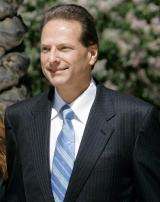Gov't misconduct may unravel Broadcom fraud case

(AP) -- When the federal government revealed it had launched a massive investigation of some of Broadcom Corp.'s top executives for backdating stock options, it sent a shock wave through the business world.
Nearly two years later, the government's case could be falling apart.
In a move that stunned legal experts, a judge Wednesday dismissed an earlier guilty plea from Broadcom's co-founder, Henry Samueli, after finding he did not lie to Securities and Exchange Commission investigators probing the alleged backdating scheme at the chip-maker.
U.S. District Judge Cormac J. Carney plans to hold a hearing Tuesday on a defense motion to dismiss charges against former Broadcom Chief Financial Officer William J. Ruehle after allegations of prosecutorial misconduct.
A third defendant, Broadcom co-founder Henry T. Nicholas III, is set for trial next year on two separate indictments involving backdating and federal drug charges.
Backdating involves retroactively setting a stock option's exercise price to a low point in the stock's value, boosting profits when the shares are sold. It is legal when properly accounted for, but if not properly disclosed it can allow companies to overstate profits and underpay taxes, while diminishing shareholder value.
Irvine, Calif.-based Broadcom was ultimately forced to write down $2.2 billion in profits after the backdating was uncovered.
Both of the judge's recent decisions are dramatic about-faces from his earlier rulings in a case that has been fraught with allegations of prosecutorial impropriety from almost the beginning.
Last year, Carney rejected Samueli's plea agreement, which spared him from prison, as too lenient and said he faced "very serious allegations of securities fraud." The judge also rejected a similar motion last year to dismiss Ruehle's charges on grounds of government misconduct.
Legal experts following the saga said the latest developments don't bode well for prosecutors struggling to hold together their high-profile case against the leaders of the semiconductor giant, which collected nearly $5 billion in revenue last year.
"It appears here that in order to craft this case, (prosecutors) squared a lot of corners and pushed a lot of square pegs into round holes," said Evan Stewart, an attorney specializing in securities law. "The dismissal of Mr. Samueli's matter is quite unusual and the district judge must have been very, very unhappy about what he saw transpire in his courtroom to do what he did."
As a defense witness in Ruehle's trial, Samueli testified Wednesday that he lied when he told SEC investigators he wasn't involved in awarding stock options because he didn't thoroughly consider the question. But he said he felt strong-armed into making his plea even though he believed he did nothing wrong.
He said he felt if he fought, he could face a massive indictment like the ones against his former colleagues.
In a defense motion last week, Ruehle's attorneys alleged that lead prosecutor Andrew Stolper leaked information about Samueli's 2007 grand jury appearance to reporters and contacted the attorneys of two other witnesses to try to influence their testimony.
One of those was former Broadcom general counsel David Dull, who was granted immunity to testify in Ruehle's case.
In another instance, the filing alleges, the prosecution suggested to a former Broadcom executive who had struck a plea deal in exchange for her cooperation that she could face additional criminal charges if she did not testify or do so in a certain way for the government.
In a hearing Wednesday away from the jury, Stolper acknowledged leaking information to the press, calling it the "stupidest thing I have done in my career." He declined to comment outside court.
Thom Mrozek, spokesman for the U.S. attorney's office, declined to comment on any of the allegations and said the government would lay out its position in court filings due Monday.
Jurors are scheduled to return Dec. 17 for closing arguments in Ruehle's trial.
Samueli and Nicholas started Broadcom in 1991 and took it public in 1998. The company grew to 7,000 employees worldwide and is a leading manufacturer for the chips used in everything from cable boxes to cell phones worldwide.
©2009 The Associated Press. All rights reserved. This material may not be published, broadcast, rewritten or redistributed.
















